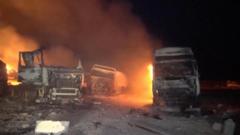**Qatar's Prime Minister highlights potential breakthroughs in ceasefire talks, while concerns over humanitarian crises continue to grow.**
**Qatar Reports Minor Progress in Gaza Ceasefire Negotiations**

**Qatar Reports Minor Progress in Gaza Ceasefire Negotiations**
**Efforts are underway to broker a lasting agreement amid ongoing conflict between Israel and Hamas.**
In a recent statement, Qatar's Prime Minister, Sheikh Mohammed bin Abdulrahman Al Thani, indicated that there has been "a bit of progress" concerning negotiations for a renewed ceasefire in Gaza, although he admitted that the overarching question of how to conclusively end the war remains unanswered. This development follows his discussions with Israel's Mossad chief, David Barnea, in Doha.
Turkey's Foreign Minister, Hakan Fidan, noted that Hamas has shown a willingness to engage in discussions aimed at facilitating a long-term resolution to the ongoing conflict. Notably, Hamas is reportedly considering a deal that could involve the release of remaining hostages, contingent on a cessation of hostilities lasting five years as well as a potential disarmament agreement, dependent on the withdrawal of Israeli forces from Gaza—something the Israeli government has shown no interest in pursuing.
Since the resumption of hostilities in March, the Gaza health ministry has reported over 2,151 Palestinian fatalities, underscoring the human cost of this conflict. The situation escalated further when an Israeli soldier and police officer were killed in recent fighting. Tensions continue to rise, with Israel's complete blockade initiated in early March leading to significant humanitarian concerns in the region.
During his press conference, Sheik Mohammed pointed out the stark differences between Israel's demands and Hamas's conditions for a ceasefire, emphasizing the lack of common goals between the two sides. He expressed anxiety over the dwindling avenues for achieving peace amidst ongoing conflicts.
In parallel, a Hamas delegation held discussions with Egyptian officials, focusing primarily on a ceasefire arrangement and the grave humanitarian situation in Gaza. A Palestinian source has suggested that Hamas is open to transferring control of Gaza to a mutually agreed Palestinian authority, which could be the West Bank-based Palestinian Authority (PA) or a new governing body.
However, Israeli Prime Minister Netanyahu has dismissed any possibility of cooperation with the PA, reiterating his opposition to a Palestinian state. Tensions within Palestinian political factions were further highlighted when PA President Mahmoud Abbas criticized Hamas harshly, branded them as "sons of dogs," and demanded the group's disarmament as well as the release of hostages.
With internal divisions continuing to plague the Palestinian leadership and widespread discontent among the population regarding inaction, the struggle for unified governance post-conflict remains uncertain, complicating any efforts towards establishing long-term peace.
The ongoing war commenced on October 7, 2023, with Hamas's attack leading to significant casualties and displacements. The humanitarian crisis is exacerbated by reported shortages of food and basic supplies in Gaza, drawing international concerns over war accountability and the responsibilities of Israel concerning aid provisions.
As negotiations persist amid escalating violence, the global community watches closely, hoping for a breakthrough that could alleviate the suffering of civilians caught in the crossfire. The implications for both regional stability and Palestinian governance will be significant as discussions continue.
Turkey's Foreign Minister, Hakan Fidan, noted that Hamas has shown a willingness to engage in discussions aimed at facilitating a long-term resolution to the ongoing conflict. Notably, Hamas is reportedly considering a deal that could involve the release of remaining hostages, contingent on a cessation of hostilities lasting five years as well as a potential disarmament agreement, dependent on the withdrawal of Israeli forces from Gaza—something the Israeli government has shown no interest in pursuing.
Since the resumption of hostilities in March, the Gaza health ministry has reported over 2,151 Palestinian fatalities, underscoring the human cost of this conflict. The situation escalated further when an Israeli soldier and police officer were killed in recent fighting. Tensions continue to rise, with Israel's complete blockade initiated in early March leading to significant humanitarian concerns in the region.
During his press conference, Sheik Mohammed pointed out the stark differences between Israel's demands and Hamas's conditions for a ceasefire, emphasizing the lack of common goals between the two sides. He expressed anxiety over the dwindling avenues for achieving peace amidst ongoing conflicts.
In parallel, a Hamas delegation held discussions with Egyptian officials, focusing primarily on a ceasefire arrangement and the grave humanitarian situation in Gaza. A Palestinian source has suggested that Hamas is open to transferring control of Gaza to a mutually agreed Palestinian authority, which could be the West Bank-based Palestinian Authority (PA) or a new governing body.
However, Israeli Prime Minister Netanyahu has dismissed any possibility of cooperation with the PA, reiterating his opposition to a Palestinian state. Tensions within Palestinian political factions were further highlighted when PA President Mahmoud Abbas criticized Hamas harshly, branded them as "sons of dogs," and demanded the group's disarmament as well as the release of hostages.
With internal divisions continuing to plague the Palestinian leadership and widespread discontent among the population regarding inaction, the struggle for unified governance post-conflict remains uncertain, complicating any efforts towards establishing long-term peace.
The ongoing war commenced on October 7, 2023, with Hamas's attack leading to significant casualties and displacements. The humanitarian crisis is exacerbated by reported shortages of food and basic supplies in Gaza, drawing international concerns over war accountability and the responsibilities of Israel concerning aid provisions.
As negotiations persist amid escalating violence, the global community watches closely, hoping for a breakthrough that could alleviate the suffering of civilians caught in the crossfire. The implications for both regional stability and Palestinian governance will be significant as discussions continue.


















